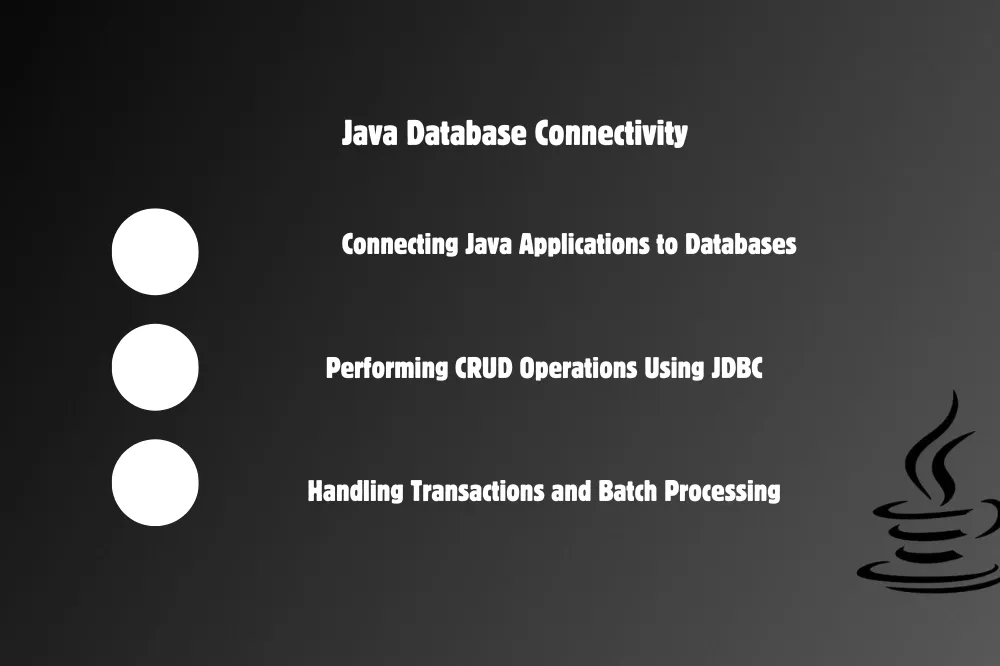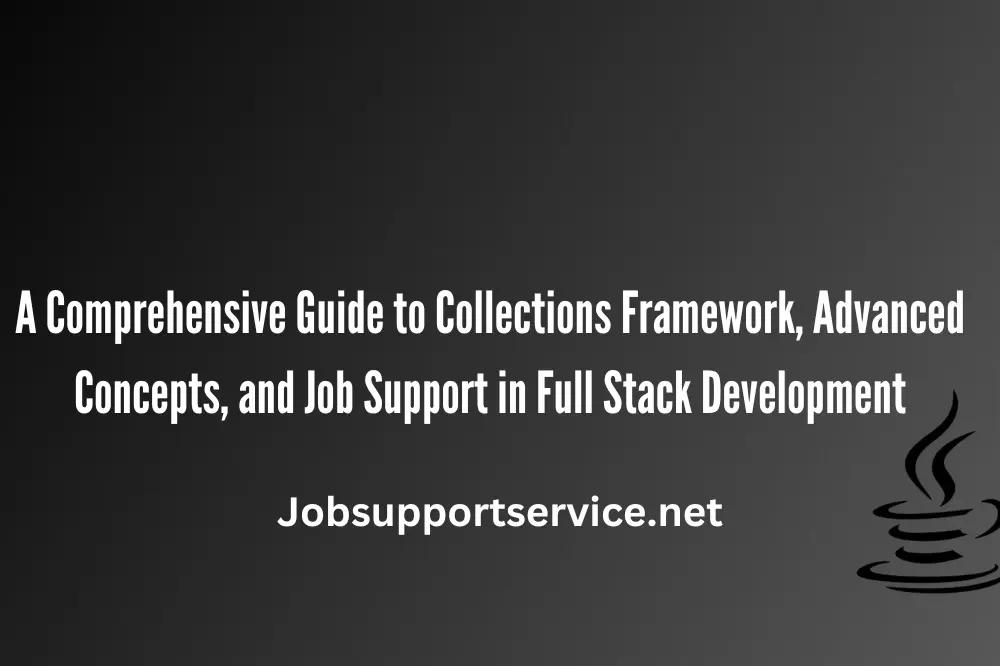Introduction:
Java, a Versatile Programming Language:
Java stands as a stalwart in the realm of programming languages, renowned for its versatility and cross-platform compatibility. It has been a constant force in software development, powering applications from mobile devices to enterprise-level systems.
Importance of Mastering Collections Framework and Advanced Java for Full-Stack Developers:
Collections Framework and Advanced Java concepts serve as the bedrock for developers aiming to excel in the full-stack domain. A robust understanding of data structures and advanced features empowers developers to create efficient, scalable, and maintainable applications.
Overview of Job Support in Java Full Stack Development:
Navigating the competitive landscape of Java Full Stack development requires not just technical prowess but also practical insights. Job support becomes crucial as developers face real-world challenges, and this guide will equip you with the necessary skills to thrive in a professional setting.
The Collections Framework provides a unified architecture for representing and manipulating collections of objects in Java. It includes interfaces and classes that facilitate the handling of data structures, making it an indispensable part of Java development.
Importance of Data Structures and Collections in Programming:
Efficient data structures lie at the heart of algorithmic efficiency. Understanding how to leverage collections allows developers to optimize data storage, retrieval, and manipulation, contributing to the overall performance of their applications.
Overview of Key Interfaces and Implementations:
Explore essential interfaces like List, Set, and Map, and their concrete implementations such as ArrayList, HashSet, and HashMap. Each serves a unique purpose, and mastering them provides developers with versatile tools for various scenarios.
In-Depth Exploration of Collection Types:
Dive into the intricacies of each collection type, understanding when to use ArrayList for dynamic arrays, HashSet for unique elements, and HashMap for key-value pairs. Real-world use cases will illuminate the practical applications of each.
Iterators and Enhanced for Loops:
Learn how to traverse collections effectively using iterators and enhanced for loops. These constructs simplify the process of accessing elements within collections, enhancing code readability and maintainability.
Advanced Java Concepts: Taking Your Skills to the Next Level:
Multithreading and Concurrency:
Understanding Threads and Their Lifecycle:
Delve into the world of multithreading, grasping the fundamentals of threads and their lifecycle. Learn how to create and manage threads to execute tasks concurrently, optimizing performance in multi-core systems.
Synchronization and Thread Safety:
Explore the challenges of shared resources in concurrent environments. Understand synchronization mechanisms to ensure thread safety, preventing data inconsistencies and race conditions.
Java’s Concurrent Utilities:
Discover Java’s built-in concurrent utilities, such as the Executor framework and ConcurrentHashMap. These tools simplify the implementation of parallel processing and enhance the scalability of applications.
Best Practices for Efficient Multithreading:
Master best practices for writing efficient and reliable multithreaded code. Cover topics like thread pooling, deadlock prevention, and efficient resource utilization.
Java Database Connectivity (JDBC):
Connecting Java Applications to Databases:
Learn the intricacies of connecting Java applications to databases using JDBC. Understand the JDBC architecture and establish connections to various database management systems.
Performing CRUD Operations Using JDBC:
Master the art of performing CRUD (Create, Read, Update, Delete) operations with JDBC. Execute SQL queries and manipulate databases programmatically from your Java applications.
Handling Transactions and Batch Processing:
Explore transaction management in JDBC, ensuring data consistency across multiple database operations. Learn about batch processing to improve efficiency when dealing with large datasets.
Exception Handling:
Understanding Exceptions and Errors:
Comprehend the role of exceptions and errors in Java programming. Learn how to differentiate between checked and unchecked exceptions and effectively handle them in your code.
Using Try-Catch Blocks and Handling Exceptions Gracefully:
Implement try-catch blocks to gracefully handle exceptions and provide meaningful error messages. Enhance the robustness of your applications by anticipating and managing potential errors.
Custom Exceptions and Best Practices:
Explore the creation of custom exceptions to address specific scenarios in your applications. Adopt best practices in exception handling to ensure code reliability and maintainability.
Reflection and Annotations:
Dynamic Class Loading and Introspection:
Delve into reflection, a powerful feature that allows dynamic class loading and introspection. Understand how to inspect and manipulate classes, methods, and fields during runtime.
Annotation Basics and Their Applications:
Explore the basics of annotations and their use in Java development. Understand how annotations provide metadata to your code and how frameworks leverage them for configuration and processing.
Implementing Custom Annotations:
Learn the process of creating custom annotations to extend the functionality of your code. Understand how to use annotations for code organization, documentation, and configuration.
Java Full Stack Job Support: Navigating the Industry Landscape:
Overview of Full Stack Development in Java:
Gain insights into the broader scope of Full Stack Development in Java. Understand the front-end and back-end technologies, frameworks, and tools commonly used in Full Stack projects.
Key Technologies and Frameworks in the Java Full Stack Ecosystem:
Explore the essential technologies and frameworks, including Spring, Hibernate, and others, that form the foundation of Java Full Stack development. Understand their roles and applications in creating end-to-end solutions.
Building a Strong Portfolio and Resume:
Learn how to craft a compelling portfolio and resume that showcase your skills and experience as a Java Full Stack developer. Understand the key elements that employers look for in potential candidates.
Interview Preparation Tips and Common Technical Interview Questions:
Prepare for job interviews with valuable tips and insights. Familiarize yourself with common technical interview questions related to Java Full Stack development, and understand how to approach and answer them effectively.
On-the-Job Challenges and How to Overcome Them:
Explore common challenges faced by Java Full Stack developers in real-world projects. Gain practical strategies and solutions to overcome these challenges and excel in your professional endeavors.
Continuous Learning and Staying Updated:
Emphasize the importance of continuous learning in the dynamic field of Java development. Provide resources and strategies for staying updated with the latest trends, technologies, and best practices
Conclusion:
Recap of the Importance of Mastering Collections Framework and Advanced Java:
In the realm of Java development, mastering the Collections Framework and Advanced Java concepts is paramount. These foundational skills play a critical role in crafting robust and efficient applications. The Collections Framework empowers developers to manage data structures effectively, while Advanced Java concepts enhance the codebase for optimal performance. Together, they form the backbone of a proficient Java developer’s toolkit, enabling the creation of scalable and maintainable software solutions.
Encouragement for Aspiring Java Full Stack Developers:
To aspiring Java Full Stack developers, embarking on the learning journey of mastering Collections Framework and Advanced Java opens doors to exciting opportunities in the industry. Embrace the challenges with enthusiasm, as these skills not only enhance your capabilities but also position you as a sought-after professional in the competitive landscape of Full Stack development. Remember, continuous learning and application of these skills are key to unlocking your potential and achieving success in your Java Full Stack career.
Java Full Stack Job Support As you navigate this journey, consider seeking Java Full Stack job support to bridge the gap between theoretical knowledge and practical application. This invaluable assistance provides insights, guidance, and solutions to real-world challenges, ensuring a smoother transition into professional Java Full Stack development.
- Machine Learning Operations on GCP: Job Support Essentials - May 20, 2024
- Serverless Computing Support on GCP: Expert Advice - May 18, 2024
- Database Administration in GCP: Job Support Best Practices - May 17, 2024

